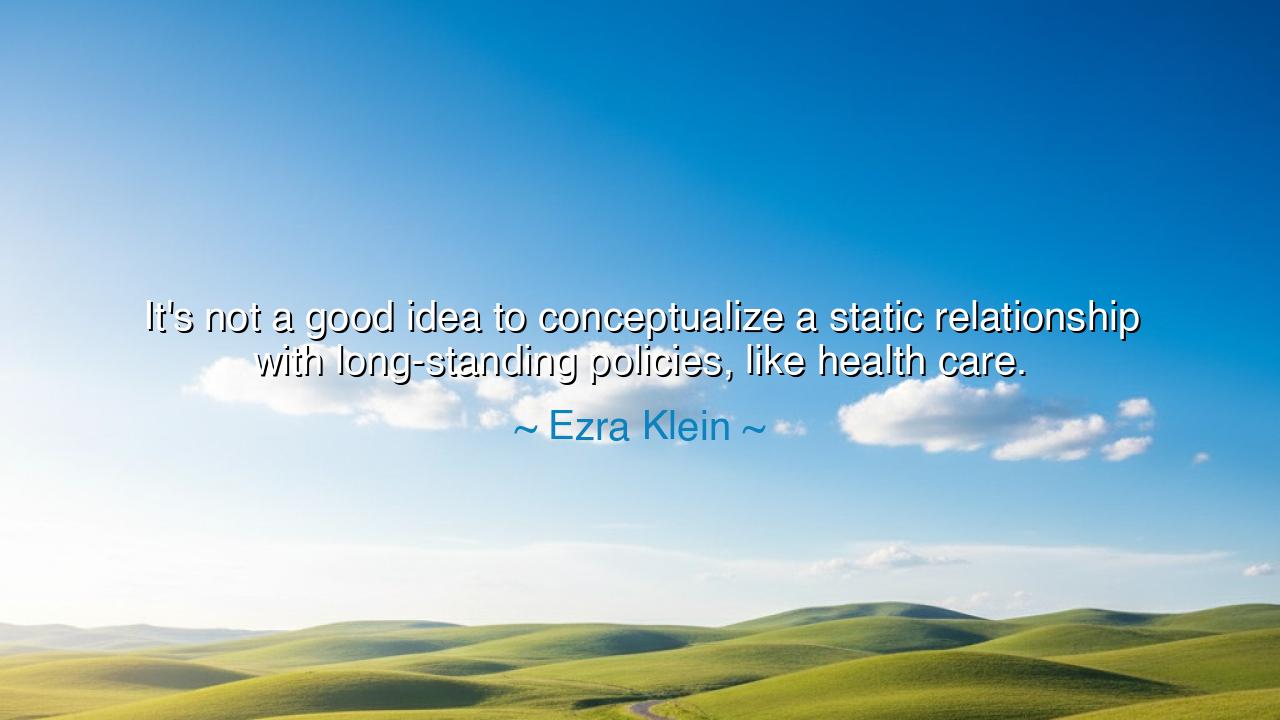
It's not a good idea to conceptualize a static relationship with
It's not a good idea to conceptualize a static relationship with long-standing policies, like health care.






“It’s not a good idea to conceptualize a static relationship with long-standing policies, like health care.” So spoke Ezra Klein, a thinker of the modern age, whose words remind us of an ancient truth: that all human institutions, like all living things, must evolve or perish. In this saying lies the wisdom that life itself is motion — that to cling to what was once right, when the world has changed, is to invite decay. Klein, a scholar of governance and society, points to health care as an example of this eternal principle, yet his meaning reaches far beyond the policies of a single age. He speaks to the heart of progress — to the need for adaptation, renewal, and the courage to revise what no longer serves life’s greater good.
From the dawn of civilization, the wise have known that stagnation is the enemy of wisdom. The ancient Greeks taught that the universe is ever in flux, that “you cannot step into the same river twice,” for both the water and the man have changed. The same holds true for nations and their laws. A policy that once healed may, in time, become a chain; a rule that once protected may, in another age, stifle growth. Thus, Klein’s warning is not merely political — it is philosophical. He cautions mankind against the arrogance of permanence, against believing that the structures of yesterday can eternally serve the needs of today.
Consider, for example, the story of Otto von Bismarck, the German statesman who, in the 19th century, forged one of the world’s first systems of national health insurance. His vision was revolutionary in his time — born of industrial hardship and the rising power of the working class. Yet the system he created, like all human constructs, required change as the world transformed. When new diseases arose, when populations aged, when technology reshaped medicine itself, nations that clung too tightly to Bismarck’s old model found their people suffering under its weight. Those that adapted — expanding, reforming, modernizing — preserved not only the system, but its spirit of compassion and care. The lesson is clear: a policy that does not breathe with the times becomes a relic, not a remedy.
Klein’s words also carry a moral charge — a call to humility. For to conceptualize a static relationship with any human system is to forget that all such systems are made by imperfect beings. When we hold a policy as sacred and immutable, we turn it into an idol, and in doing so, we betray the living people it was meant to serve. The purpose of health care, after all, is not to defend tradition, but to defend life. And life is never still. The disease that kills today did not exist a century ago; the medicine that heals tomorrow is not yet discovered. Thus, the wise leader does not worship the form of the past, but listens to the voice of the present — and prepares for the needs of the future.
We see the same truth in the story of Florence Nightingale, who transformed the care of the sick through innovation and relentless questioning. When she entered the hospitals of the Crimean War, she found not healing but horror — disease spread by filth, neglect, and ignorance. The old ways of medicine were killing more than curing. Yet she did not accept them as static truths; she changed them. Through observation, adaptation, and courage, she birthed modern nursing and public health. Had she revered tradition more than truth, thousands would have perished. Her life stands as living proof that progress demands motion, and that compassion must always be wedded to reform.
Thus, when Ezra Klein speaks of health care, he speaks not merely of policy, but of the nature of human progress. What is true in medicine is true in every realm of life — in law, in education, in governance, in faith itself. The world shifts beneath our feet, and the systems that guide us must shift with it. To refuse change is to deny reality; to embrace it is to affirm life. The wise must therefore look upon every institution as a garden — to be tended, pruned, and renewed, lest it be choked by the weeds of complacency.
So, my children, let this be the lesson: cherish what endures, but do not worship what must evolve. Build boldly, but do not fear to rebuild. When a system grows rigid, breathe into it the air of reason and compassion. When an old law burdens rather than blesses, have the courage to reform it. For to hold fast to the past in a world that is ever-changing is to choose death over life. But to adapt — to listen, to learn, to labor for renewal — is to walk the eternal path of progress, where humanity, though imperfect, moves ever closer to the light of wisdom and the grace of understanding.






AAdministratorAdministrator
Welcome, honored guests. Please leave a comment, we will respond soon